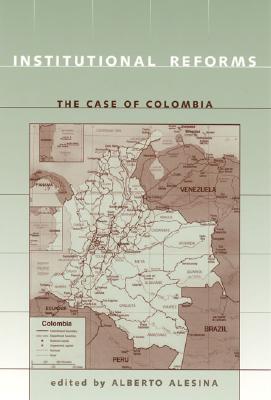

 MIT Press
MIT Press
Institutional Reforms: The Case of Colombia


Key Metrics
- Alberto Alesina
- MIT Press
- Hardcover
- 9780262012140
- 9.28 X 6.56 X 0.89 inches
- 1.35 pounds
- Business & Economics > Economics - General
- English
 Secure Transaction
Secure TransactionBook Description
These studies of Colombian economic, political, and social institutions offer not only theoretically grounded analyses but also practical recommendations for policy reform. Experts from the United States, Europe, and Colombia approach such problems as executive-legislative branch conflict, fragmented political parties, crime prevention, inefficient decentralization, and mistargeted social spending from a political economics perspective. Their findings provide an illuminating example of the way ideas from this relatively new area of research can be applied to real-world problems.
Colombia suffers not only from institutional problems--many of which may stem from its overly rigid 1991 constitution--but also high rates of violent crime, endemic drug trafficking, guerrilla warfare, and political corruption; the authors do not shrink from these topics, but treat them for the most part from an institutional perspective.
Following a useful overview of recent economic history in Colombia, three chapters examine political institutions, discussing separation of powers, Colombia's complicated electoral and political party system, and reform of the judicial system. The remaining chapters treat economic and social institutions, covering the fiscal imbalance of centralized taxing and decentralized spending, transparent and fiscally responsible budget processes, education reform, the provision of social services, and the advantages of an independent central bank. Each chapter includes specific policy proposals that are politically feasible and require minimal legislative action. The proposed solutions to Colombia's institutional problems also shed light on similar problems in other developing countries.
Author Bio
Alberto Alesina was a leader in the field of Political Economics and has published extensively in all major academic journals in economics. He has published five books and edited many more. His two most recent books are The Future of Europe: Reform or Decline, published by MIT Press, and Fighting Poverty in the US and Europe: A World of Difference, published by Oxford University Press. He was a co-editor of the Quarterly Journal of Economics for eight years and associate editor of many academic journals.
Alberto Alesina, born in Italy in 1957, was the Nathaniel Ropes Professor of Political Economy at Harvard University. He served as Chairman of the Department of Economics from 2003 - 2006. He obtained his Ph.D. from Harvard in 1986. He was also a member of the National Bureau of Economic Research and the Center for Economic Policy Research. He was a member of the Econometric Society and of the American Academy of Arts and Sciences.
He was a leader in the field of Political Economics and has published extensively in all major academic journals in economics. He has published five books and edited many more. His two most recent books are The Future of Europe: Reform or Decline, published by MIT Press, and Fighting Poverty in the US and Europe: A World of Difference, published by Oxford University Press. He was a Co-editor of the Quarterly Journal of Economics for eight years and Associate Editor of many academic journals. He has published columns in many leading newspapers around the world and has visited several institutions including MIT, Tel Aviv University, University of Stockholm, The World Bank, and the IMF.
His work has covered a variety of topics: political business cycles, the political economy of fiscal policy and budget deficits, the process of European integration, stabilization policies in high inflation countries, the determination of the size of countries, currency unions, the political economic determinants of redistributive policies, differences in the welfare state in the US and Europe and, more generally, differences in the economic system in the US and Europe, the effect of alternative electoral systems on economic policies, and the determination of the choice of different electoral systems.
Source: Harvard University Department of Economics
Videos
No Videos
Community reviews
Write a ReviewNo Community reviews